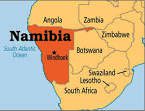The political atmosphere in Namibia is tensing up amid allegations of interference into Windhoek’s internal affairs by some European countries as the country heads for crucial elections set for November.
The governing SWAPO party and some political analysts have raised the red flag over this week’s lunch meeting between opposition Independent Patriotic Change leader Panduleni Iitula and ambassadors from Germany and other European Union (EU) countries.
Namibia’s Vice President Netumbo Nandi-Ndaitwah alleged at a SWAPO Central Committee gathering on Thursday that the lunch meeting was part of a plot by “enemies of democracy” to undermine former liberation movements in southern Africa and instal those parties that are friendly to them.
According to state media reports, Nandi-Ndaitwah criticised the Germany embassy, which hosted the lunch meeting, for suggesting that Iitula is widely projected to be the next president of Namibia.
“What a diplomatic statement, particularly from a country with whom we still have a serious pending issue,” Nandi-Ndaitwah is quoted as saying.
Namibia and Germany have an emotive outstanding issue of reparations the Nama-Herero genocide that claimed tens of thousands of lives between 1904 and 1907.
The genocide occurred when German imperial forces responded to an uprising by the native Herero and Namaqua people in 1904 by putting several thousands of people into concentration camps and driving others into the Namib desert where many died of starvation or dehydration.
Nandi-Ndaitwah is the SWAPO presidential candidate for this year’s high-stakes general elections. If elected, she would become Namibia’s first female president.
On Wednesday, Namibia’s International Relations Minister Peya Mushelenga summoned envoys from the European Union delegation and the German embassy following the engagement with Iitula.
He cautioned them to respect the sovereignty of Namibia despite it being a small state.
The EU Delegation to Namibia confirmed in a statement on Friday that its heads of mission had “an informal lunch (with litula) to discuss the situation in Namibia, including, amonth others, his election campaign.”
“This is part of our general engagement with relevant actors in Namibia as is normal for all diplomatic missions to perform,” the EU mission said.
The lunch meeting was attended by ambassadors from Portugal, Spain, France, the EU and Finland.
It, however, denied that the ambassadors discussed “matters that fall within the purview of the Government of Namibia, nor did we comment on or prejudge the outcome of any election.”
The run-up to the election, in which Namibians are due to choose a president, members of the National Assembly and local councillors, has already been marred by incidents of violence involving supporters of different political parties.
JN/APA


